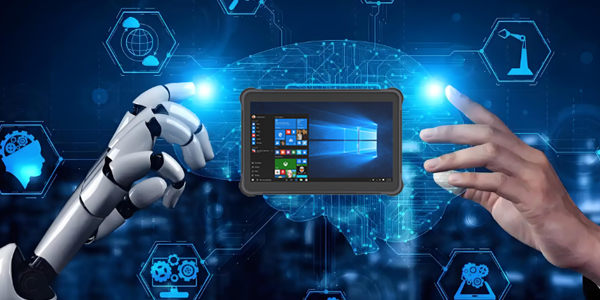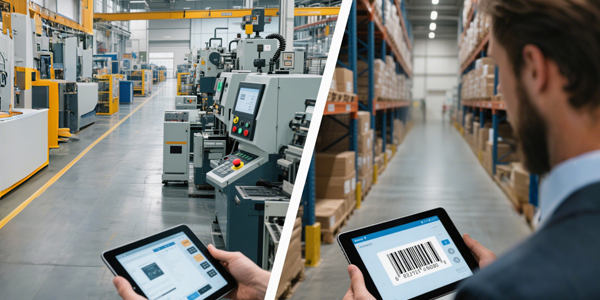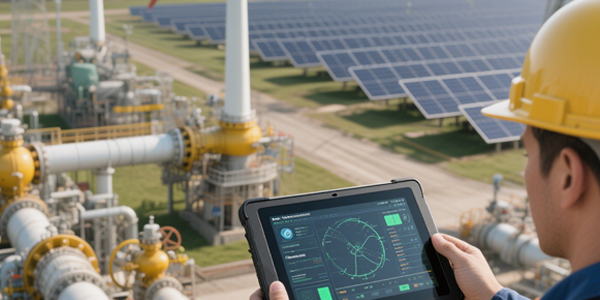In the era of Industry 4.0, industrial tablets have emerged as indispensable tools, bridging the gap between human operators and advanced machinery. These ruggedized devices are engineered to thrive in harsh environments, offering unparalleled durability, connectivity, and computational power.In this article, we will explores the latest advancements, key features, and transformative applications of industrial tablets across sectors.
The Rise of Industry 4.0 and the Need for Robust Hardware
Industry 4.0, often referred to as the Fourth Industrial Revolution, is characterized by the fusion of physical production with digital technologies. Key pillars like the Industrial Internet of Things (IIoT), artificial intelligence (AI), machine learning, and big data analytics are driving a shift toward smarter, more efficient operations. At the heart of this transformation lies the need for hardware that can withstand harsh industrial environments while providing the computing power and connectivity required to manage complex workflows.
Traditional consumer tablets or laptops fall short in industrial settings due to their lack of durability, limited customization options, and inability to integrate with legacy systems. Industrial tablets, however, are purpose-built for these challenges. Designed to operate in extreme temperatures, dusty factories, wet environments, and even areas prone to vibrations or shocks, they offer reliability that standard devices simply cannot match.
Key Features That Make Industrial Tablets Indispensable
1. Rugged Design for Harsh Environments
Industrial tablets are engineered with ruggedized casings, reinforced screens, and IP65/IP67 ratings, making them resistant to water, dust, and physical impacts. This durability ensures they can operate seamlessly on factory floors, in outdoor construction sites, or inside heavy machinery—environments where consumer electronics would fail within days. For example, a tablet used in a food processing plant must withstand regular sanitization with harsh chemicals, while one in a mining operation needs to survive constant exposure to dust and vibrations.
2. Powerful Performance and Customization
Modern industrial tablets come equipped with high-performance processors, ample RAM, and advanced graphics capabilities, allowing them to run complex industrial software such as human-machine interfaces (HMIs), computer-aided design (CAD) tools, or real-time data visualization platforms. They also support modular designs, enabling businesses to add specialized peripherals like barcode scanners, RFID readers, or GPS modules tailored to specific applications. This flexibility makes them adaptable to diverse industrial use cases, from quality control to predictive maintenance.
3.Seamless Connectivity and Integration
Industry 4.0 thrives on connectivity, and industrial tablets excel in this area. They support multiple communication protocols, including Wi-Fi, Bluetooth, 4G/LTE, and even 5G, ensuring seamless integration with sensors, machines, and cloud-based platforms. This connectivity allows workers to access real-time data from anywhere on the factory floor, monitor equipment performance, and receive instant alerts for anomalies. For instance, a maintenance engineer can use an industrial tablet to pull up real-time sensor data from a malfunctioning machine, diagnose issues remotely, and trigger automated repair workflows—minimizing downtime and improving productivity.
4.Enhanced Security for Sensitive Operations
Industrial networks are increasingly vulnerable to cyber threats, making security a top priority. Industrial tablets come with built-in security features like biometric authentication, encrypted data storage, and secure boot processes to protect against unauthorized access and data breaches. Ensuring that they can be safely integrated into critical infrastructure without compromising operational security.
Transforming Industrial Operations: Real-World Applications
1. Smart Manufacturing and Process Optimization
In smart factories, industrial tablets serve as central hubs for managing production lines. Workers use them to access work instructions, monitor machine status, and input real-time data on output quality or equipment performance. For example, a tablet mounted on a production line can display real-time KPIs (key performance indicators) like throughput rates or defect ratios, allowing managers to make instant adjustments to optimize processes. Integration with AI algorithms can even enable predictive maintenance by analyzing machine data to predict component failures before they occur.
2. Logistics and Warehouse Management
In logistics and Inventory Management, industrial tablets streamline inventory tracking, order fulfillment, and supply chain operations. Equipped with barcode scanners and GPS, they enable workers to efficiently locate goods, update inventory records in real-time, and manage shipping processes. In a distribution center, a warehouse worker can use a rugged tablet to receive automated picking instructions, scan items for accuracy, and update the warehouse management system—reducing errors and improving order processing speed. Hosoton’s tablets reduce human error by 40% in warehouse operations .
3. Remote Monitoring and Control
One of the most significant advantages of industrial tablets is their ability to enable remote operations. In industries like energy, utilities, or oil and gas, workers can use these devices to monitor remote assets such as pipelines, wind turbines, or solar panels. Real-time data from sensors is transmitted to the tablet, allowing technicians to identify issues like leaks, voltage fluctuations, or equipment malfunctions without being physically present. This not only enhances safety but also reduces the need for costly on-site inspections.
4. Quality Control and Compliance
Ensuring product quality and regulatory compliance is critical in industries like pharmaceuticals, automotive, and food processing. Industrial tablets facilitate digital quality control by enabling workers to capture data, take photos of defects, and generate instant reports. They can also access standardized checklists and compliance documentation, ensuring that every step of the production process meets regulatory requirements.
Future Trends
•Modular Design: Swappable compute modules (e.g., NVIDIA Jetson) let industries upgrade AI capabilities without replacing entire devices.
•Sustainability: Solar charging and biodegradable materials are emerging to meet circular economy demands.
•5G and Digital Twins: Ultra-low-latency networks will enable real-time synchronization of physical assets with virtual replicas for predictive analytics.
Conclusion
Industrial tablets are no longer mere tools—they are the nervous system of smart factories and digital workplaces. By combining ruggedness with intelligence, they empower industries to embrace automation, IoT, and AI. As technology evolves, these devices will continue to redefine efficiency and reliability across sectors.
For businesses, investing in a future-ready industrial tablet requires balancing durability, connectivity, and scalability. Partnering with Hosoton ensures access to tailored solutions that align with operational goals.
Explore the latest industrial tablets to elevate your digital transformation journey.
Post time: Apr-12-2025







